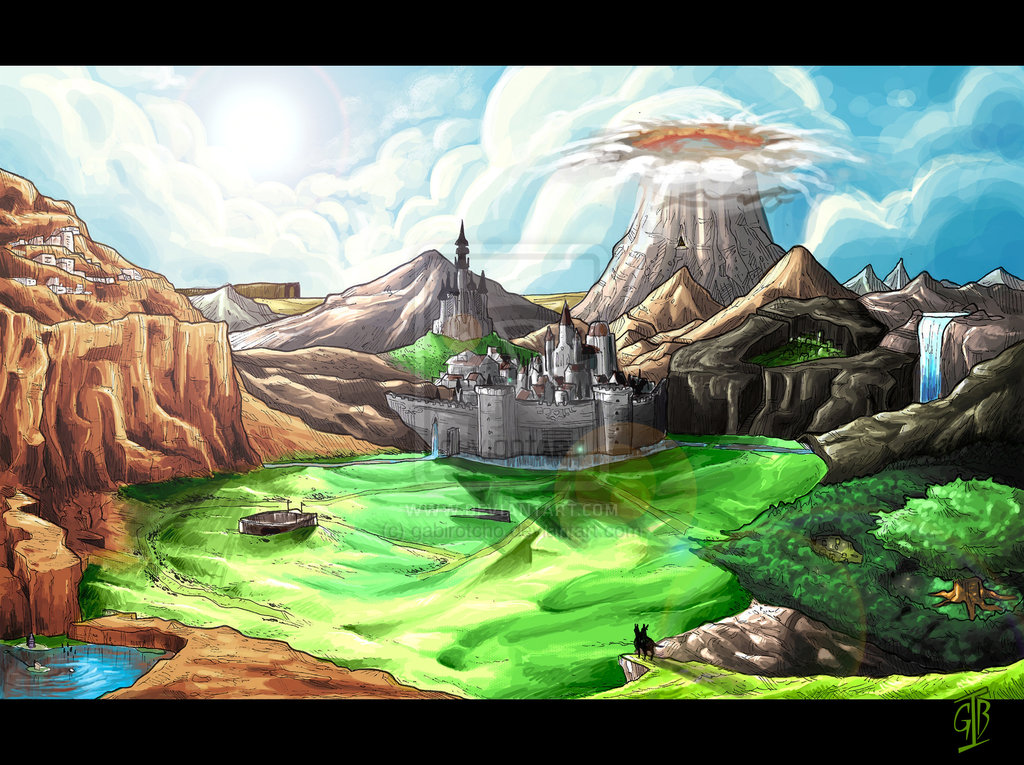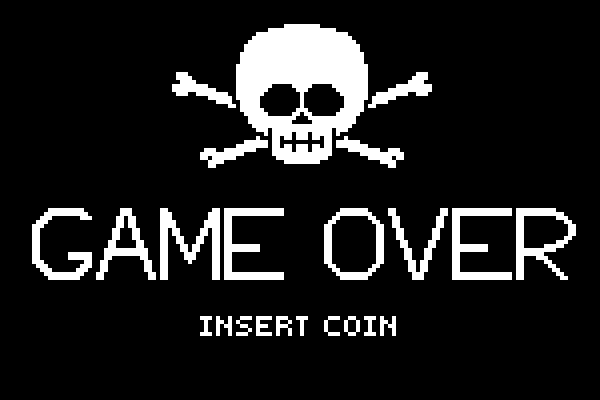This article spoilers for Dark Souls and Bloodborne in entirety.
“Remember, there are no happy endings in Dark Souls.”
Wise words from my partner that I rapidly chose to ignore almost as much as Rule 1 (Don’t Get Greedy). It’s not that I wanted to ignore these. I typically take stuff my partner says to heart. But, honestly, I couldn’t believe that was the case. You can always get some semblance of a happy (if bittersweet and tragic) ending if you tried hard enough. I would know. I always worked to get them.
“Well,” I challenged him. “I’m going to do my best to get them. I’m going to save everyone.”
So my partner sat, staring at me with a slight smile, and clarified. “So you’re going to be good?”
“Yeah! I’m gonna be good!”
And then he laughed.
“Jynx, in this world, that’s how people die.”
—
Well. He wasn’t wrong.
—
The story above was about my foray into Dark Souls but, honestly, it holds true for Bloodborne as well. Maybe even more so. Because you know that saying “The road to hell is paved with good intentions”? Well that’s Bloodborne in a nutshell.
Games like Dark Souls and Bloodborne kill me. Not just because they’re harder than I want to admit to play. Because when I play games, I like to be a good person (™). In games like Fable and Jade Empire, I’m so good I glow blue. I ate a crunchy chick in Fable and restarted my game. That sort of thing.
In games like Dragon Age, I do try to make the decisions based off of what i know and what I think is best, but I do admit to looking up outcomes if the choices are too similar, and picking the one that I hope is the “most good.” I want to do the most good with the least amount of harm.
This …sort of can be done in Dark Souls. I’d argue it, depending on how you interact with the world. Even if you can’t save anything really in Lordran, you can at least try your best.
In Bloodborne, in Yharnam, it ultimately doesn’t matter.
—
If you’re new to Bloodborne, or just didn’t have time to pay too much attention to the plot because you were trying not to get your face smashed into the dirt, let’s start at the beginning. The player character, known only as the Hunter, came to Yharnam for unknown reasons, but probably to be cured of some affliction. Yharnam was known, previously, for being able to heal anything with their “blood.”
Yeah…well, the Hunter quickly finds out that the blood also contained an illness that now most people have, and it turns them into monsters (hence the name of the game. Literally the whole thing is about a bloodborne illness).
The Hunter, in order to find the blood (“Paleblood”) they seek, must take part in the Hunt and halt the plague.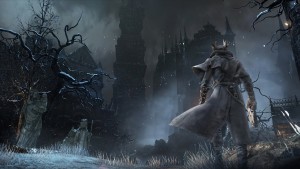
Okay, so, so far so good, right? Going to stop a plague. That’s a noble goal!
While the Hunter is out looking for this source, they (and the player) are met with many choices as they encounter the many people of Yharnam and beyond. And this is where it rapidly becomes impossible to be good. Even if you want to be.
I mean, honestly, you can be a pretty big asshole really easily. Like, you could kill everyone you meet, not trying to save anyone or learn backstory or what not. That’s super easy and if that’s your prerogative, that’s fine by me.
The game is much harder if you play by its rules. Mentally and emotionally. If you buy into the story and believe that the Hunter might be able to fix things, this game aims to tell you that intentions and actions don’t always line up.
Even if you really are acting for the best.
This can be seen in interactions with NPCs, for sure. I won’t go into them all, because there are many, but it’s safe to say that Eileen the Crow might be the only one who has a happy ending, and even with her it’s incredibly vague. (I’m in the camp of She’s Not Dead ™ but that was also a lot of blood she lost. And you really were only trying to help…it’s not your fault she fought a battle she couldn’t win…)
See what I mean?
But I do want to highlight a few interactions, namely with Father Gascoigne’s daughters, the Odeon Chapel Dweller, and “Isofeka”.
Starting with Father Gascoigne, the hunter that went mad and accidentally killed his wife. I mean, that’s hard enough as it is, him turning into a beast and all. But before you find all of that out, you are charged by his younger daughter to find their mother, who’s gone off to find Gascoigne. The mother forgot the music box that kept him sane. So you know that it’s not going to end well. No surprise, it didn’t. You kill him and find his wife’s body nearby.
The trouble is, what about the girls? There’s two ways to break the news to the girls, and it all depends on timing. I won’t spoil how you get about these endings. But you get to choose: Do both girls die or just one?
Spoilers: You cannot save the younger daughter. You just can’t. Even if you think you might be able to (i.e. sending her to the safe haven of Odeon’s Chapel). If you tell the girl her parents are dead, and show her the broach you get from her dead mother, she wanders outside and is killed by a boar in the sewers. If you try to send her to Odeon’s Chapel, she dies on the way. You could also send her to “Isofeka’s” clinic (yes there’s a reason I keep putting that in quotes), but more on that later. Spoilers, she still dies.
You can save the older sister from going out and dying when the Moon rises, though. You have to give her the bloodstained ribbon. Then you can listen to her cry for the rest of the game about being alone. It’s…not much better.
You tried your best.
But wait! What about the Chapel Dweller and “Isofeka.” The Chapel Dweller actually does offer safe haven and you can save people that way…Carefully. It’s probably the only time you can honestly be a good person (though it may not matter. More on that later).
But you have to be careful.
It has to do with whom you save, in what order, and if you accept blood from anyone (and in what order). Because you have to keep everyone happy or certain people will go insane and kill everyone.
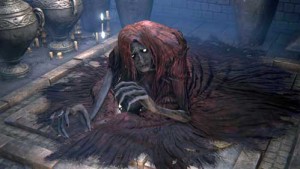 Also if you judge the Chapel Dweller on appearances, chances are you might have already messed up and killed him. Oops. He actually is a good guy. And the folks in the Chapel (presumably) survive until morning, even with the Blood Moon. But if you’re like me, and you’re trying to send everyone you can to a safe haven, you might accidently send in someone who’s a Beast. And he’ll kill everyone.
Also if you judge the Chapel Dweller on appearances, chances are you might have already messed up and killed him. Oops. He actually is a good guy. And the folks in the Chapel (presumably) survive until morning, even with the Blood Moon. But if you’re like me, and you’re trying to send everyone you can to a safe haven, you might accidently send in someone who’s a Beast. And he’ll kill everyone.
Or maybe you’ll piss off the matron, who doesn’t like the “woman of the night,” and she’ll kill everyone for you.
Why are people so complicated? Especially when I’m just trying to be a good person!
And then there’s “Isofeka”. I’m sure the real Isofeka was a wonderful person who really did operate her clinic with her patient’s best will in mind. Not that that really matters because you accidently kill her (well, what’s left of her) when you come back. And then “Isofeka” has taken over. (This is the only time I can legitimately say it was aliens and mean it. Because it was Aliens. Ur…Celestials. Same difference). The real Isofeka is dead, not because you did anything wrong, but because she happened to run a clinic. That’s not your fault.
What could be your fault is how you operate the Clinic. Because, honestly, you don’t find out until much later that the real Isofeka is dead. The imposter seems nice enough when you first meet them, however. They offer to take people who are “lost” and seeking a safe haven, and protect them at the clinic. Ur, well, in not too coded language, they offer to experiment on the patients.
To be honest, you could probably mistakenly send someone to “Isofeka’s” clinic once or twice and not realize that the Celestial Emissaries that keep showing up aren’t respawning enemies. After all, the first time you come back there (not including the start of the game), you get…attacked isn’t the right word for it. There’s an Emissary there, let’s just say. So it’s alright, I get it. Maybe you just thought that was the enemy of the area.
There’s also a guy who doesn’t trust you at all, and maybe you try to be a good person and send him to the Chapel. Well, he won’t believe you and he’ll head to the Clinic and die. Or maybe you’ll send that madman I warned you about over to the Clinic. He’s already a beast, right?
“Isofeka’s” Clinic is a wonderful moral dilemma! Because, on one hand, “Isofeka” rewards the Hunter for every person you send over there (the Chapel Dweller does not). The Hunter will also get different runes and loot from each Emissary that used to be a person. Which, overall, makes the game easier in some respect.
If you can ignore the fact that they all used to be people.
Maybe the best way to play this game is to not interact with anyone. Then, at least, it’s not your fault when they die. Or worse.
—
Then there’s the plot.
Granted, I probably could talk for a few hours about the plot of Bloodborne, so I’ll spare you most of it. But it’s safe to say that the whole premise of the game is based on good intentions. And then everyone went mad.
It’s also safe to say that simply progressing the plot (and doing what you thought was good. You know, that ending the Hunt thing I told you about) might actually make things worse.
Intent and which ending you get. That’s what’ll do it. Unfortunately, you won’t be a good person, but you might make it out semi-decent and covered in blood.
Let’s say you’re like me, and you really did intend to help, and did your best to be “good” throughout the whole game. Then you raise the Blood Moon. You have to, it’s how you get to find your way to Mergo and stop the Nightmare.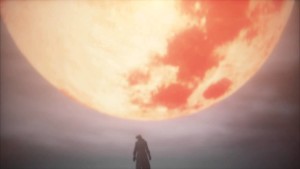
You also kill everyone in Yharnam. Or a good majority of them. They kind of all get turned to stone. The people who stayed inside and the people you sent to the Chapel survive but…well, that’s about 10 people to the whole city.
But you slay Mergo…well, first, his wetnurse (who’s bloody terrifying), and then him. He’s a baby. You literally have to kill a baby.
It could be argued that maybe he was already some monster, but there’s no way to tell. You hear a baby crying, you fight a terrifying shadow creature, and you hack up a crib.
By now you really can’t be a good person.
But maybe you–like me–are holding on to the hope. That you can salvage this. After all, you helped Queen Yharnam rest and peace. Most of the monsters are gone!
Here comes the choice. You have to choose yes or no when Gherman offers you the way out. Yes means he kills you, and you wake up. This is the neutral ending to me. You did your best, you survived the Hunt, but nothing is better. It might also be a lot worse.
But what if you fight him? With the intent to end the dream, stop the Hunt?
Such. Good. Intentions.
For those of you who’ve beaten Gherman, the First Hunter, you know what shows up afterwards. The Moon Presence. And you take his place, and a new Hunt begins.
The intention to stop the Hunt makes a new, more terrifying Hunt instead.
—
But! What about the third ending?
The one you have to eat three parts of an umbilical cord to get? I waffle on this one. On one hand, to me, to actually eat three parts of an alien umbilical cord tells me that the Hunter is probably just as crazy as everyone else and probably is no longer “Good.” You have to kill either the imposter “Isofeka” or Ariana to get the last one, as the other two are plot driven. Both are giving birth (for lack of a better term, honestly) to monsters (We’ll save the issue of consent surrounding this for another time. “Isofeka” seemed to be the only one who really knew what was happening, but that’s beside the point).
Then you have to eat them.
But le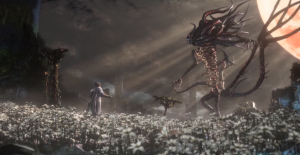 t’s say, somehow, the Hunter knew this was the only way to fight the Moon Presence and was determined to win. Let’s say they still had nothing but good intentions. It’s hard to hold on to, because beating the Moon Presence turns the Hunter into a Great One.
t’s say, somehow, the Hunter knew this was the only way to fight the Moon Presence and was determined to win. Let’s say they still had nothing but good intentions. It’s hard to hold on to, because beating the Moon Presence turns the Hunter into a Great One.
Hey, maybe the end of the world is the “most good” you can do in Bloodborne.
—
For anyone who likes black and white morality, Bloodborne is not a game for you. The game presents so many morally grey problems that don’t have good answers, and that the game will answer for you if you don’t choose.
I don’t say this about many games, but if you don’t want to face the problems, you just can’t play it.
That being said, I love Bloodborne for its representation of this you can’t actually fix anything trope. It shows that sometimes, even in fantasy, you can’t always be the hero you want to be. It’s not the rule to live by, for sure, but it certainly does present a warning:
Follow your intentions through with appropriate actions, or be the cause of the harm you wish to stop.
Or, in Bloodborne’s terms, “Don’t be undone by the Blood.”




